情态动词是一种本身有一定的词义
- 格式:doc
- 大小:79.50 KB
- 文档页数:21
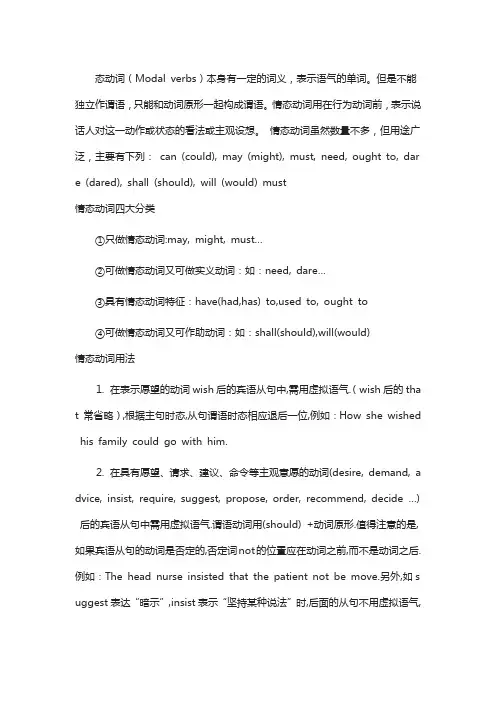
态动词(Modal verbs)本身有一定的词义,表示语气的单词。
但是不能独立作谓语,只能和动词原形一起构成谓语。
情态动词用在行为动词前,表示说话人对这一动作或状态的看法或主观设想。
情态动词虽然数量不多,但用途广泛,主要有下列:can (could), may (might), must, need, ought to, dar e (dared), shall (should), will (would) must情态动词四大分类①只做情态动词:may, might, must…②可做情态动词又可做实义动词:如:need, dare…③具有情态动词特征:have(had,has) to,used to, ought to④可做情态动词又可作助动词:如:shall(should),will(would)情态动词用法⒈在表示愿望的动词wish后的宾语从句中,需用虚拟语气.(wish后的tha t 常省略),根据主句时态,从句谓语时态相应退后一位,例如:How she wished his family could go with him.⒉在具有愿望、请求、建议、命令等主观意愿的动词(desire, demand, a dvice, insist, require, suggest, propose, order, recommend, decide …)后的宾语从句中需用虚拟语气.谓语动词用(should) +动词原形.值得注意的是,如果宾语从句的动词是否定的,否定词not的位置应在动词之前,而不是动词之后.例如:The head nurse insisted that the patient not be move.另外,如s uggest表达“暗示”,insist表示“坚持某种说法”时,后面的从句不用虚拟语气,例如:Her pale face suggests that she is ill.或He insisted that he did not kill the boy.。
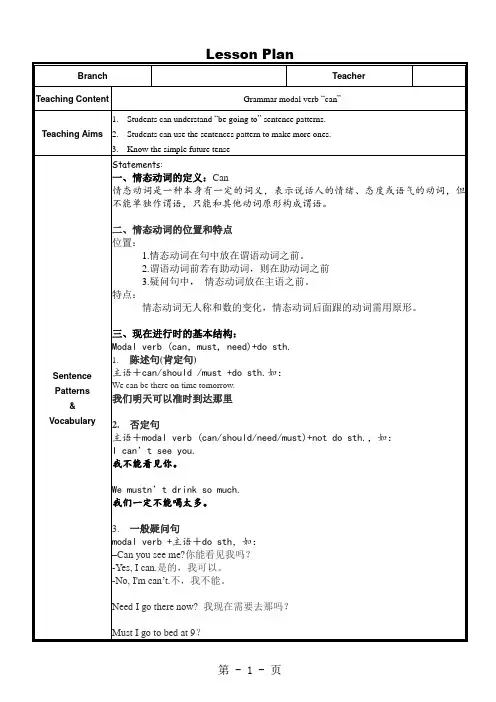
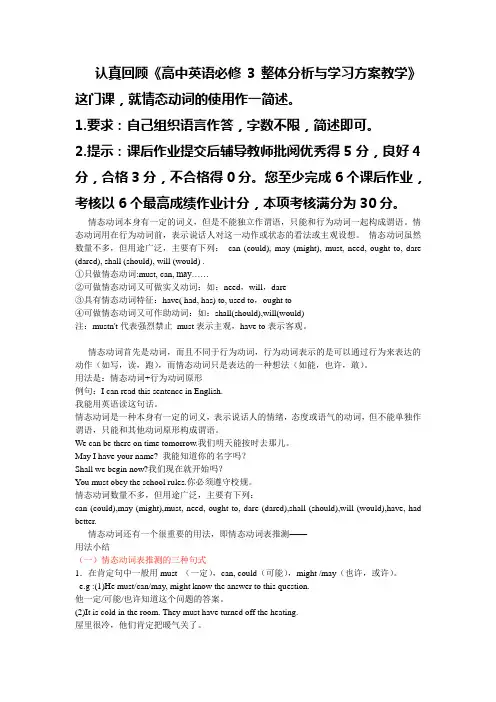
认真回顾《高中英语必修3整体分析与学习方案教学》这门课,就情态动词的使用作一简述。
1.要求:自己组织语言作答,字数不限,简述即可。
2.提示:课后作业提交后辅导教师批阅优秀得5分,良好4分,合格3分,不合格得0分。
您至少完成6个课后作业,考核以6个最高成绩作业计分,本项考核满分为30分。
情态动词本身有一定的词义,但是不能独立作谓语,只能和行为动词一起构成谓语。
情态动词用在行为动词前,表示说话人对这一动作或状态的看法或主观设想。
情态动词虽然数量不多,但用途广泛,主要有下列:can (could), may (might), must, need, ought to, dare (dared), shall (should), will (would) .①只做情态动词:must, can, may……②可做情态动词又可做实义动词:如:need,will,dare③具有情态动词特征:have( had, has) to, used to,ought to④可做情态动词又可作助动词:如:shall(should),will(would)注:mustn't代表强烈禁止must表示主观,have to表示客观。
情态动词首先是动词,而且不同于行为动词,行为动词表示的是可以通过行为来表达的动作(如写,读,跑),而情态动词只是表达的一种想法(如能,也许,敢)。
用法是:情态动词+行为动词原形例句:I can read this sentence in English.我能用英语读这句话。
情态动词是一种本身有一定的词义,表示说话人的情绪,态度或语气的动词,但不能单独作谓语,只能和其他动词原形构成谓语。
We can be there on time tomorrow.我们明天能按时去那儿。
May I have your name? 我能知道你的名字吗?Shall we begin now?我们现在就开始吗?You must obey the school rules.你必须遵守校规。
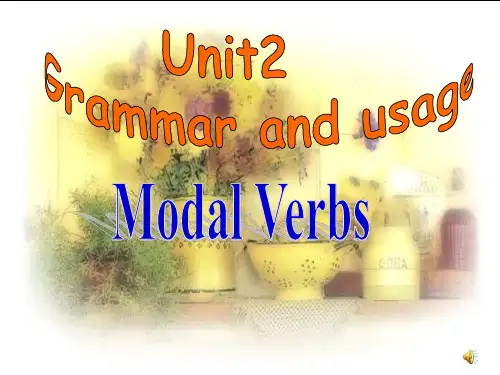
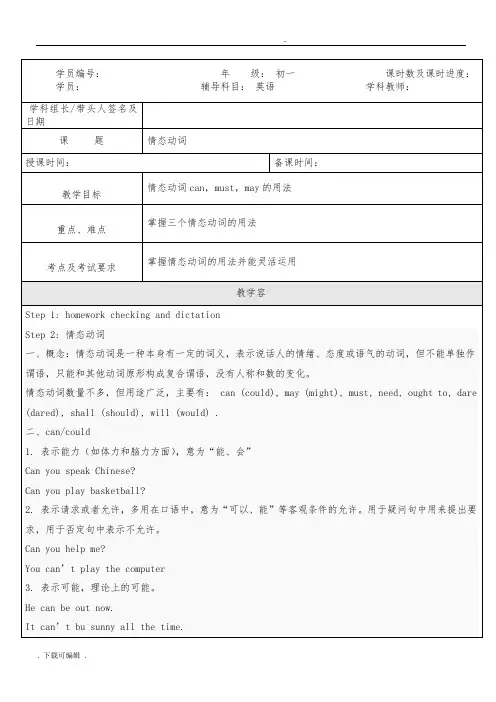
4. 表示说话人的猜测、怀疑、不肯定等,主要用于否定句、疑问句、感叹句中,带哟感情色彩。
How can yo be so rude!Can he be back?5. could可以作为can的过去式,也可以在提出请求时表示委婉。
He could save the little boy.Could you help me?三、may, might1. 表示“许可、准许”,此时与can同义,可以互换使用You may/can go to the cinema this evening.☆注意:表许可时其答语可以用“Yes,you may.”但是由于用may做肯定回答语气显得生硬、严肃,因此一般用Yes, please. /Certainly. / Of course.这些回答显得热情、客气。
拒绝对方时,其答语可以用No, you mustn’t. / No, you can’t. / Sorry, you can’t. / No, please don’t等--May I come in? --Yes, please--May I use your ruler? --Certainly. Here you are.2. 表示可能性时,常用在肯定句中,意为“可能、也许”He may be very busy now.He said that she might not be at work today.3. can和may都可以表示推测。
Can通常用在否定句和疑问句中,may通常用在肯定句和否定句中。
虽然两者都可以用于否定句,但是程度不同,can’t的语气比may not更强。
It can’t be true.It may not be true.4. 表示希望、祈求、祝愿,常可以译为“祝愿”May you have a good time.May you be happy.5. might可以作为may的过去式,也可以在提出请求时表委婉;在表示可能性时,might的可能性比may 更小☆注意:can和may的区别1. can和may都可以表示“许可”,在征求对方意见时用may比较多 May I go now?2. 在询问客观上是否可以时,用can Can we take the books out?3. 在两者都可以用时,may更客气一些4. 在述句中用can比较多 You can sit here.5. can还可以表示能力,may无此用法6. 在否定句中一般不用may not,常用can’t表示不可能He can’t be at home tonight.四、must1. 表示“必须、一定要”,多强调说话人的主观看法(表示客观需要时,常用_____________)否定式mustn’t表示“一定不要,禁止”You must see the doctor.Must you go soon?对于must开头的一般疑问句,如果要做否定回答,可以用needn’t, don’t have to,不能用mustn’t --Must I come over tonight? --No, you needn’t2. 表示推测,意为“准是,一定是”,但是通常只用于肯定句,在否定句、疑问句常用can’tIt must be true.Can it be true? It can’t be trueStep 3:Practice一、用can,may,must的适当形式填空1. __________ I ask you a question?2. Attending a ball __________ be exciting3. Michael __________ be a policeman, for he is mush too short.4. –Are you coming to Jeff’s party? --I’m not sure. I __________ go to the concert instead.5. He never takes a taxi. He __________ be very poor.6. I thought you __________ like something to read, so I brought you some books.7. Look! I __________ stand on my hands.8. He __________ have been to Shanghai.9. The play is not interesting. I really __________ go now.10. She __________ like this place.二、根据汉语提示给出下列句子的回答1. –Must we hand in our exercise books today?______________________________.(不,没有必要)2. Can I call you by your first name?______________________________(是的,可以)3. Could I come here again tomorrow?______________________________(是的,你可以来)4. Must we send in our pla this week?______________________________(是的,必须交)5. May I use you pen?______________________________(可以,给你)三、选择1. Helen __________ go on the trip with us, but she isn’t quite sure yet.A shallB mustC mayD can2. Johnny, you __________ play with the knife, you __________ hurt yourself.A won’t ,can’tB mustn’t, mayC shouldn’t , mustD can’t, shouldn’t3. A computer __________ think for itself; it must be told what to do.A can’tB couldn’tC may notD might not4. –Could I borrow your dictionary? --Yes, of course you __________.A mustB mightC canD could5. How __________ you say that you really understand the whole story if you have covered onlya part of the article?A canB mustC needD may6. Oh, dear! What on earth __________ this mean?A couldB canC mayD might7. –Must I finish my homework today? --No, you __________.A can’tB needn’tC mustn’tD may not8. --__________ I speak to Mary? --Speaking.A MustB NeedC MayD Shall9. This match problem is too hard. Nobody __________ do it.A may notB mayC can’tD can10. –Can you speak Japanese? --No, I __________.A can’tB mustn’tC may notD needn’t四、在空格处填入适当的词,一空一词Tom: Excuese me. __________ you tell me the way to No. 3 Middle School?Wang Hai: __________, I’m a student there. I’m going to school now. You __________follow me. Tom: Thank you! I’m new in No. 3 Middle School. My name is Tom. __________ I know you name? W: Wang Hai. Why __________ your parents send you to school for the first time?T: Well, I prefer doing things by myself. However, I’m lucky today. You are so helpful. Thank you!W: It’s a pleasure. We are schoolmates now. __________ you please help me with my English? T: __________! I’m weak in Chinese, __________ you teach me Chinese?W: Sure! Let’s help each other.T: Good idea!W: By the way, how do you like Chinese traditional music?T: Very much! Erhu, dizi, and pipa sound really wonderful.W: There is going to __________ a Chinese traditional music concert at the Capital Satdium. I’ve got two tickets. Would you like to come?T: __________ love to . thanks so much!W: Don’t mention it!Step 4:more practiceHomework一、单项选择4. As we know, fish ______ die out of water.A. mayB. is going toC. canD. will5. –Can you answer my question, Lily? –Yes, I ______.A. mayB. needC. mustD. can6. –Excuse me, ______ you tell me the way to the nearest bus station?--Sorry, I can’t. I’m a stranger here.1."Could I call you by your first name?""Yes,you___."A.willB.couldC.mayD.might选C,为什么不可以选B或D2.You___walk for miles and miles among the hills without meeting anyone.A.mustB.needC.mayD.should选C,为什么不能选D,推测的可能性会大一些3.I wasn't sure whether I___offer to help or not.A.shouldB.mightC.wouldD.needed选A 是不是因为虚拟语气?4.____someone get into trouble,please dial 110.A.ShouldB.IfC.ShallD.May选A,这种句型不太理解5.Why____it get colder when we go up a mountain?We are getting nearer to the sun!A.ought toB.wouldC.shouldD.must选C 为什么不选A~1,can may 表示许可,(could是can表示“能够,有能力做某事”时候的委婉语),所以could 不可以,同时might既是may的过去时,也是may的委婉语,用might回答别人,在这里不礼貌2.这题缺少上下文,所以答案不是唯一的,看个人理解,出题人出的不够严密呀3.不是虚拟语气,虚拟语气主要2种用法(1,表示与现实不符合的假设;2,在建议,请求等词之后的从句里使用)4 should可以表示“非常不可能的可能性”,并且用这个意思的时候一般倒装:Should anyone phone (ie If anyone phones), please tell them I'm busy. 有人打来, 就说我很忙. ---当然打110不是什么好事,说的可能性小点比较符合文法5 这里should表示“竟然” 如果是ought to 那就是理所当然拉,不需要问句形式了。
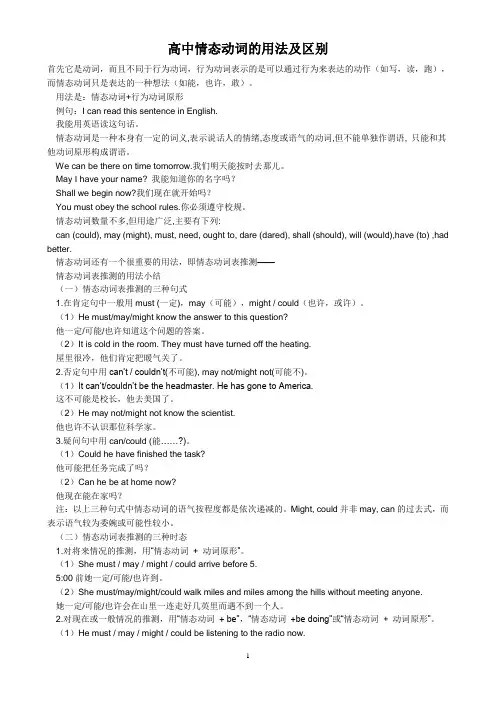
高中情态动词的用法及区别首先它是动词,而且不同于行为动词,行为动词表示的是可以通过行为来表达的动作(如写,读,跑),而情态动词只是表达的一种想法(如能,也许,敢)。
用法是:情态动词+行为动词原形例句:I can read this sentence in English.我能用英语读这句话。
情态动词是一种本身有一定的词义,表示说话人的情绪,态度或语气的动词,但不能单独作谓语, 只能和其他动词原形构成谓语。
We can be there on time tomorrow.我们明天能按时去那儿。
May I have your name? 我能知道你的名字吗?Shall we begin now?我们现在就开始吗?You must obey the school rules.你必须遵守校规。
情态动词数量不多,但用途广泛,主要有下列:can (could), may (might), must, need, ought to, dare (dared), shall (should), will (would),have (to) ,had better.情态动词还有一个很重要的用法,即情态动词表推测——情态动词表推测的用法小结(一)情态动词表推测的三种句式1.在肯定句中一般用must (一定),may(可能),might / could(也许,或许)。
(1)He must/may/might know the answer to this question?他一定/可能/也许知道这个问题的答案。
(2)It is cold in the room. They must have turned off the heating.屋里很冷,他们肯定把暖气关了。
2.否定句中用can’t / couldn’t(不可能), may not/might not(可能不)。
(1)It can’t/couldn’t be the headmaster. He has gone to America.这不可能是校长,他去美国了。
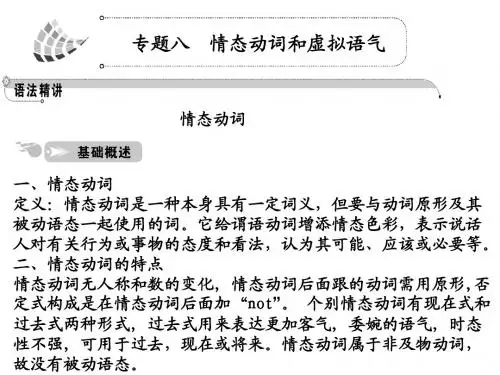
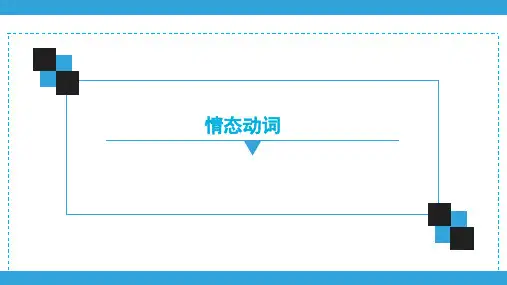

would是情态动词吗would是情态动词。
would是will的过去式形式,其中文意思是“(用于转述)将,将会;带出想象的结果;(表示可能发生的事情没有发生,是因为之前另一件事没有发生)就会”。
情态动词简介一、定义情态动词(Modal verbs)本身有一定的词义,表示语气的单词。
但是不能独立作谓语,只能和动词原形一起构成谓语。
情态动词用在行为动词前,表示说话人对这一动作或状态的看法或主观设想。
二、分类1、只做情态动词:may、might、must等;2、可做情态动词又可做实义动词:如:need、can等;3、具有情态动词特征:have(had,has) to,used to,ought to;4、可做情态动词又可作助动词:如:shall(should)、will(would)三、用法1、情态动词首先它得是动词,而且不同于行为动词,行为动词表示的是可以通过行为来表达的动作(如写,读,跑),而情态动词只是表达的一种想法(如能,也许,敢)。
2、情态动词是一种本身有一定的词义,表示说话人的情绪,态度或语气的动词,但不能单独作谓语,只能和其他动词原形构成谓语。
3、情态动词表推测。
四、例句1.He said he would be here at eight o'clock.他说他将在八点钟到达这里。
2.He could have gone home.他可能已回家了。
3.Can you finish this work tonight?你今晚能完成这项工作吗?4.She must/may/might/could walk miles and miles among the hills without meeting anyone.她一定/可能/也许会在山里一连走好几英里而遇不到一个人。
5.I would like a place I could call my own.我想要一个自己的窝儿。
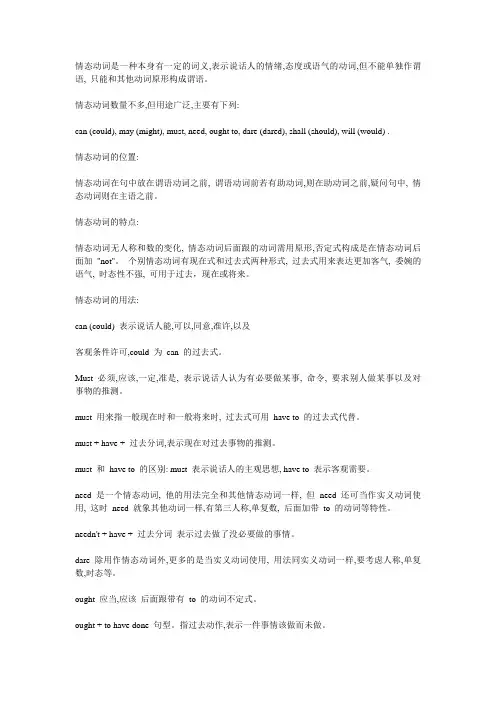
情态动词是一种本身有一定的词义,表示说话人的情绪,态度或语气的动词,但不能单独作谓语, 只能和其他动词原形构成谓语。
情态动词数量不多,但用途广泛,主要有下列:can (could), may (might), must, need, ought to, dare (dared), shall (should), will (would) .情态动词的位置:情态动词在句中放在谓语动词之前, 谓语动词前若有助动词,则在助动词之前,疑问句中, 情态动词则在主语之前。
情态动词的特点:情态动词无人称和数的变化, 情态动词后面跟的动词需用原形,否定式构成是在情态动词后面加"not"。
个别情态动词有现在式和过去式两种形式, 过去式用来表达更加客气, 委婉的语气, 时态性不强, 可用于过去,现在或将来。
情态动词的用法:can (could) 表示说话人能,可以,同意,准许,以及客观条件许可,could 为can 的过去式。
Must 必须,应该,一定,准是, 表示说话人认为有必要做某事, 命令, 要求别人做某事以及对事物的推测。
must 用来指一般现在时和一般将来时, 过去式可用have to 的过去式代替。
must + have + 过去分词,表示现在对过去事物的推测。
must 和have to 的区别: must 表示说话人的主观思想, have to 表示客观需要。
need 是一个情态动词, 他的用法完全和其他情态动词一样, 但need 还可当作实义动词使用, 这时need 就象其他动词一样,有第三人称,单复数, 后面加带to 的动词等特性。
needn't + have + 过去分词表示过去做了没必要做的事情。
dare 除用作情态动词外,更多的是当实义动词使用, 用法同实义动词一样,要考虑人称,单复数,时态等。
ought 应当,应该后面跟带有to 的动词不定式。
ought + to have done 句型。
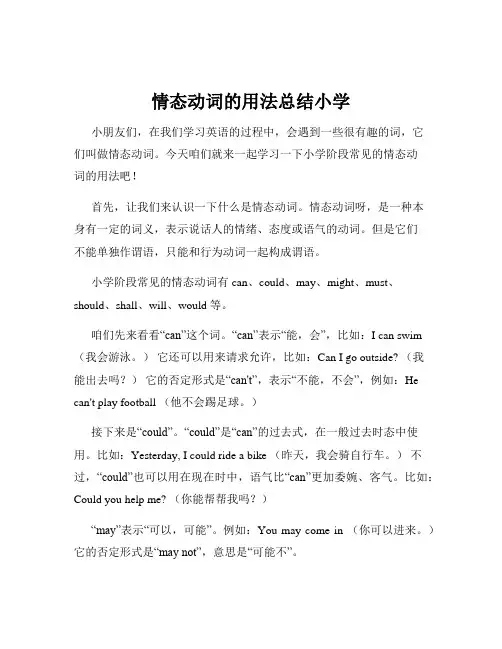
情态动词的用法总结小学小朋友们,在我们学习英语的过程中,会遇到一些很有趣的词,它们叫做情态动词。
今天咱们就来一起学习一下小学阶段常见的情态动词的用法吧!首先,让我们来认识一下什么是情态动词。
情态动词呀,是一种本身有一定的词义,表示说话人的情绪、态度或语气的动词。
但是它们不能单独作谓语,只能和行为动词一起构成谓语。
小学阶段常见的情态动词有 can、could、may、might、must、should、shall、will、would 等。
咱们先来看看“can”这个词。
“can”表示“能,会”,比如:I can swim (我会游泳。
)它还可以用来请求允许,比如:Can I go outside? (我能出去吗?)它的否定形式是“can't”,表示“不能,不会”,例如:He can't play football (他不会踢足球。
)接下来是“could”。
“could”是“can”的过去式,在一般过去时态中使用。
比如:Yesterday, I could ride a bike (昨天,我会骑自行车。
)不过,“could”也可以用在现在时中,语气比“can”更加委婉、客气。
比如:Could you help me? (你能帮帮我吗?)“may”表示“可以,可能”。
例如:You may come in (你可以进来。
)它的否定形式是“may not”,意思是“可能不”。
“might”是“may”的过去式,用法和“may”类似,但更加不确定。
比如:He said he might come tomorrow (他说他明天可能来。
)“must”表示“必须”,语气比较强烈。
比如:We must obey the traffic rules (我们必须遵守交通规则。
)它的否定形式是“mustn't”,意思是“禁止,不许”。
例如:You mustn't play on the road (你不许在马路上玩耍。
矿产资源开发利用方案编写内容要求及审查大纲
矿产资源开发利用方案编写内容要求及《矿产资源开发利用方案》审查大纲一、概述
㈠矿区位置、隶属关系和企业性质。
如为改扩建矿山, 应说明矿山现状、
特点及存在的主要问题。
㈡编制依据
(1简述项目前期工作进展情况及与有关方面对项目的意向性协议情况。
(2 列出开发利用方案编制所依据的主要基础性资料的名称。
如经储量管理部门认定的矿区地质勘探报告、选矿试验报告、加工利用试验报告、工程地质初评资料、矿区水文资料和供水资料等。
对改、扩建矿山应有生产实际资料, 如矿山总平面现状图、矿床开拓系统图、采场现状图和主要采选设备清单等。
二、矿产品需求现状和预测
㈠该矿产在国内需求情况和市场供应情况
1、矿产品现状及加工利用趋向。
2、国内近、远期的需求量及主要销向预测。
㈡产品价格分析
1、国内矿产品价格现状。
2、矿产品价格稳定性及变化趋势。
三、矿产资源概况
㈠矿区总体概况
1、矿区总体规划情况。
2、矿区矿产资源概况。
3、该设计与矿区总体开发的关系。
㈡该设计项目的资源概况
1、矿床地质及构造特征。
2、矿床开采技术条件及水文地质条件。
情态动词是一种本身有一定的词义,表示说话人的情绪,态度或语气的动词,但不能单独作谓语, 只能和其他动词原形构成谓语。 情态动词数量不多,但用途广泛,主要有下列: can (could), may (might), must, need, ought to, dare (dared), shall (should), will (would) . 情态动词的位置: 情态动词在句中放在谓语动词之前, 谓语动词前若有助动词,则在助动词之前,疑问句中, 情态动词则在主语之前。 情态动词的特点: 情态动词无人称和数的变化, 情态动词后面跟的动词需用原形,否定式构成是在情态动词后面加 "not"。 个别情态动词有现在式和过去式两种形式, 过去式用来表达更加客气, 委婉的语气, 时态性不强, 可用于过去,现在或将来。 情态动词的用法: can (could) 表示说话人能,可以,同意,准许,以及 客观条件许可,could 为 can 的过去式。 Must 必须,应该,一定,准是, 表示说话人认为有必要做某事, 命令, 要求别人做某事以及对事物的推测。 must 用来指一般现在时和一般将来时, 过去式可用 have to 的过去式代替。 must + have + 过去分词,表示现在对过去事物的推测。 must 和 have to 的区别: must 表示说话人的主观思想, have to 表示客观需要。 need 是一个情态动词, 他的用法完全和其他情态动词一样, 但 need 还可当作实义动词使用, 这时 need 就象其他动词一样,有第三人称,单复数, 后面加带 to 的动词等特性。 needn't + have + 过去分词 表示过去做了没必要做的事情。 dare 除用作情态动词外,更多的是当实义动词使用, 用法同实义动词一样,要考虑人称,单复数,时态等。 ought 应当,应该 后面跟带有 to 的动词不定式。 ought + to have done 句型。指过去动作,表示一件事情该做而未做。 ought not to have done 句型。表示一件不该做的事情却做了。 will (would)决心,愿望。 would 为 will 的过去式, will, would用于疑问句表示说话人向对方提出请求或询问,用 would 比 will 更婉转,客气。 Shall, should表示命令,警告,允诺,征求,劝告,建议惊奇。 have to,不得不,必须,表示客观条件只能如此, 而must 则表示主观思想必须
追问 情态动词的用法 情态动词的特征: 1)各个情态动词自身都有一定的词义。 2)情态动词不能在句中独立担当谓语,必须和另一动词一起构成谓语。
3)情态动词在句中不受任何人称,性,数变化的影响。 4) 情态动词后接的不定式(除ought外)都不带to ,即接动词原形。 英文中的情态动词主要有:can , could ; may , might ; must ; ought ; need ; dare , dared ,另外,shall , will , should , would在一定的场合也可用作情态动词。例如:
1. 常用情态动词的基本用法 (一)can , could 1)表示能力 I can afford to buy the car. 我能买得起这辆小汽车。 She can sing that song in English. 她能用英文唱那歌。
I could not understand the lecture given by Mr. Smith . 我听不懂史密斯先生作的那个讲座。
特别提示:be able to和 can同义,但前者可以用于更多时态。 如:The baby has been able to walk. They will be able to speak fluent English. 2) 表示允许(在口语中可以和may换用) You can go there with me. Can I come in ? They said we could start off then. 3)表示可能性 Such things can never happen again. 这样的事情决不会再发生。
A more suitable person than him for the job can not be found . 不可能找到比他更适合这份工作的人了。 4)(用于否定句、疑问句或感叹句中)表示惊异、不相信等。 How can / could you be here ? 你怎么会在这儿? She couldn't / can't be so stupid to do that . 她不可能蠢得去做那种事吧。 He couldn't / can't be over seventy .他不可能有七十多岁了。 Where could / can the boy be now ? 那孩子现在能在哪儿呢? 5)另外,could还常用于表示较客气委婉的看法、提问及用于虚拟语气的结构中。这时候,could就不可以看作是can的过去式了。而是could自己独特的用法。如:
Could you speak a little slowly ? 您能稍微说慢一点儿吗?
We would appreciate it if you could offer us any help . 如果您能为我们提供帮助的话,我们将不甚感激。 You could have done better if you had worked harder at it . 如果你再加把劲,本来可以干得更好一些的。 二)may , might 或许,可能,可以 1)表示允许 口语中,在表示允许或征求意见时,can与may可以换用。 May/Can I come in ? 我可以进来吗? Can/May I help you ? You may watch TV at the weekend. 特别提示:对May„?的问句肯定回答时常用Certainly ./Sure. / Yes, please.否定回答时常用No , „mustn’t. (语气较重)Please don’t.(语气较轻)
May I use your desk when you are not here? Yes , please. / No , you mustn’t.
2)表示推测、可能。 I may be busy from tomorrow on .从明天起我可能会忙起来。 I wondered if they might agree with the idea .我想知道他们是否会同意这种想法。 3) might是 may的过去式。用于一般现在时,同样可以表示允许或可能,但语气要委婉些。
Might (May ) I have one of your pictures. You might (may ) have a temperature. 4) may间或用来表示祝愿,也常用于表示目的或让步的状语从句中: May that day come soon . 但愿这天早日到来。
May you succeed in winning the first prize in the game . 祝愿你比赛夺冠成功。
5) might也常用于表示目的等状语从句中,或用于虚拟语气的结构中: They left off earlier on that day so that they might catch the first train .
那天,他们为了赶上头班车动身早一些。 He died so that the others might live . 为了其他的人能活下去,他自己牺牲了。 三)must 应该,必须,一定 1) must 可表示“必须”或“应该”的意思,它通常表达说话者的主观意志。must not是其否定形式,表示 “不应该”、“不允许”“禁止”, 语气比较强烈。must没有过去式。
(have to却表示由于某种客观原因而不得不做某事。除此以外,have to自身有时态的变化形式。如:
Jenny had to tidy up the room before her mother came back . 珍尼不得不在她妈妈回家以前将房间整理好。 We'll have to reconsider the whole thing . 我们将不得不重新考虑整个事情。)
You must not speak ill of others . 你一定不要说别人的坏话。
Cars must not parked here . 这里禁止停车。 Smoking must not allowed in the office . 严禁在办公室吸烟。
注意:回答以must引导的问句时,若是否定答复,不可以用mustn't 而需要用needn't 或是don't have to,因为mustn't意思是"绝不能、一定不要",而没有"不必"的意思。例如:
--Must we hand in our exercises today ? 我们今天必须交作业吗? --Yes , you must . 是的,必须交。 --No , you needn't (or , you don't have to ). 不,不必今天交。
2)表示比较肯定的推测。 You must be tired after working so long .你工作这么久以后,肯定累了吧。
You must be a teacher. 3) “must +完成式”表示对过去事情的推测。 It must have rained last night for it is so wet outside . 外面这么湿,昨晚肯定下雨了。
He must have known the answer before. 四)Ought (后接带to的不定式构成谓语动词)应该 1)表示出于职责、义务该做某事